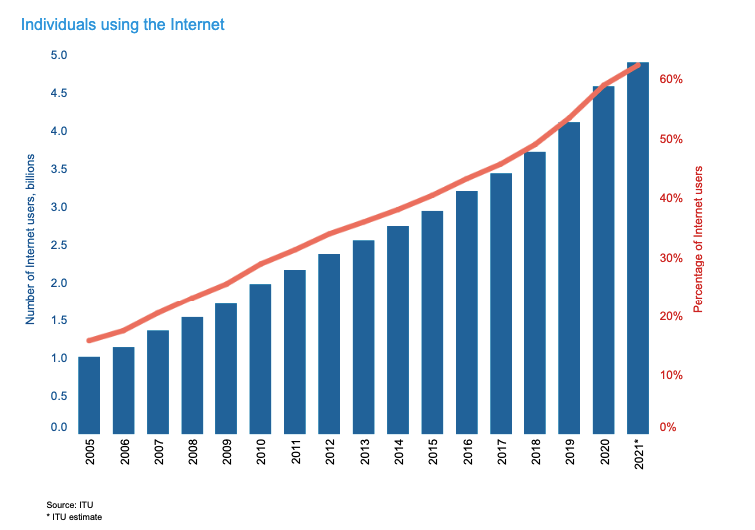The COVID-19 pandemic has taught us a lot from proper handwashing, how to work remotely and the importance of masks. The one lingering item it has taught us is that home internet service is no longer a luxury item; but a necessity. Yes, the internet is a necessity now! because when you are stuck at home, and you have to work to earn, an internet connection is a must.
As Pewresearch.org, 90% of Americans say the Internet has been important and necessity for them during the pandemic

However, the home internet hasn’t been a luxury in the recent past as well because it has been there for many types of work you can do from home. But, if we talk about the time befre15-16 years, the Home internet connection was just a luxury.
The internet is where people from all over the world go to work, attend school, keep up with news in their communities, and stay in touch with loved ones. It’s simply unacceptable for over a quarter of the US population to not have broadband internet access at home. The internet is not a luxury service now, it’s a necessity to be successful and should be treated as the necessity it’s proven to be in the recent past. It is unreasonable to allow families to suffer in silence in 2021. Whether they’re disconnected due to financial reasons or where they live, they must have affordable internet options to stay connected. Politicians, industry experts, and educators from all over the world recognize that we are allowing families to continue to be disenfranchised from a lack of a basic need.
It makes sense that electricity, water, and heat are essential to everyday life and survival, and here’s why it should have been extended to internet service years ago for anything you need money, and having an internet connection at home, opens up door to endless opportunities that help you earn well by working from home using the internet connection.
Basic Broadband Internet Access Needs To Be Accessible
Pandemic or not, high-speed internet access is important for everyday activities. Households without internet access don’t have the same opportunities in life as those who do. When was the last time you filled out a physical job application in pen and paper? Employers today expect cover letters, resumes, references, and portfolios to all be shared digitally along with their applications. Without internet access at home, those adults can’t apply for high-paying jobs or jobs they’re better qualified for. Kids can’t even complete homework or apply to colleges without internet access at home which puts them at a serious disadvantage. Studies show that kids who do not have internet access at home are less successful in school and have lower grades. Before you disregard that kids need internet access too, just remember the times have changed since parents were in grade school. I can easily relate to it as I have a son studying first class, and there is so much homework that needs an internet connection and even a printer at home. If not, we have to go out in a cafe to get that. But, if we have the internet and needed devices, kids can get things more quickly, and they also learn how to operate them.
Apart from that, you must have noticed that in cafes, libraries, coffee shops, and even retail stores, you will find a Wi-Fi connection there. It wasn’t the same as years ago. But, since it is now a necessity, internet connection is everywhere including houses. If you can check out the stats, internet usage was accelerated during the pandemic, and it has been becoming more and more necessary for us.

How The Internet Has Been Important During The COVID-19 Pandemic?
At the start of the COVID-19 pandemic, workplaces nationwide that could go remote and grade schools, and universities all shut down in-person classes in favor of remote learning to comply with shutdowns, social distancing, and capacity requirements. This was done to slow the spread of the virus so that hospitals and healthcare facilities wouldn’t be overwhelmed and overtaxed with critically ill people.
No one can deny that the internet has been essential for getting through the COVID-19 pandemic. The internet has been the sole thing that has kept families and friends in touch with one another, people employed, kids in school, and all of us entertained during these difficult times. We’ve adjusted to social distancing and lockdowns, but the internet has been essential to living as close to normal as we can. If you ask me, if there wasn’t an internet connection at home, it would have been difficult to manage our lives, and especially, my son’s studies, and having regular video chats with family member have kept going with the help of it.
How The Internet Is Important Before & After The Pandemic?
Even after we’ve overcome the COVID-19 pandemic, the internet will continue to be just as important. Remote work and remote learning won’t suddenly go away once we hit herd immunity or find a cure. We can expect both to still exist or partially exist forever. Technology is always moving forward, not backward, and for future generations to be successful, everyone needs high-speed internet access.
Low Cost Internet Programs
Under ordinary circumstances, the internet can be expensive. Households can expect to pay anywhere from $19.99 a month to $299.99 a month for high-speed broadband internet access depending on the following factors:
- Where you live: The further away you live from major cities and their surrounding suburbs, you’ll find your internet options dwindle quickly. Due to a combination of little infrastructure and only one or two choices for internet, you can expect to pay more than the average Joe living downtown for better service.
- Download and upload speeds: The faster download and upload speeds you need and want, the more you can expect to pay on your monthly bill.
- Data plans: If you choose an internet plan with capped data, you’re going to pay more on your monthly bill if you need additional data or subscribe to a higher-tiered plan.
- Additional fees: Many internet providers do not include equipment in the cost of their internet plans. If you choose an internet provider that doesn’t include a free modem router combo, you can expect to find an additional $8 to $15 a month tacked onto your monthly bill as an equipment lease fee unless you purchase your own equipment.
If you or anyone you know cannot afford internet service, you’re not alone and not without options. There are programs available for those who need it to assist in paying for internet service or qualifying for a low-cost monthly rate. Here are some federal and nonprofit low-cost internet programs for low and fixed-income families:
- Emergency Broadband Benefit
- Lifeline Support For Affordable Communications
- ConnectHomeUSA
- EveryoneOn
- Human I-T
- PCs For People
- Altice Advantage (Through Optimum & Suddenlink)
- AT&T Access
- Comcast Xfinity Internet Essentials
- Cox Connect2Complete
- Frontier Lifeline
- Internet First (Grande Communications, RCN, & Wave Communications)
- Mediacom Connect2Complete
- Spectrum Internet Assist
- Verizon FiOS Lifeline
To receive assistance from any of these programs, someone in your household will have to meet certain income requirements and already receive benefits from one of many federal assistance programs. However, every low-cost internet program has different requirements, so don’t give up and keep searching. If internet providers in your area are not on our list and you need more affordable internet service, don’t be afraid to ask them what their low-cost internet plan options are available to you. You won’t know unless you ask and they’re there to help, not judge.







Add Comment